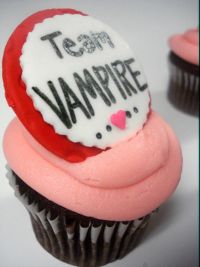
The first time I watched Twilight was too late: the whole world had already seen it, but I did not mind having my own opinion instead of listening to everyone talking about it. On my way to Frankfort, flying Lufthansa, I was enjoying my third glass of Cognac when I felt ready for an interview with Robert Pattinson.
My interest in vampires started last year, when I attended a seminar on European Romanticism in which I discovered - while reading Romantic Agony, by Mario Praz - that vampirism was the perfect trope to condense the main features of Romanticism: beauty as evil and fatal, seduction as a contagious disease, sexuality as deeply perverse and gender as confused. Lord Byron, because of his open bisexuality and scandalous incestuous affair with his sister, and certainly due to his tormented poetry and exotic odyssey in Greece, is said to have inspired the first vampire in Romantic prose: Lord Ruthven. Vampires, indeed, embody the otherness: they come from far away (Orient, Transylvania, etc), speak the universal language of seduction and prefer infection rather than reproduction. I guess you get the picture: there is something queer about vampires because these creatures are both mysterious and scary, because their sexuality does not fit the standards of heterosexual normalcy, and because their appeal mixes the Freudian concepts of eros (the libido) and thanatos (the death drive) in a disturbing, asocial way.
Having this definition of vampires in mind, try to imagine my shock when I started thinking about how the movie Twilight updates vampires. I was more than ready to decipher some subversive insights about Edward and the Cullens, but overall -- and for the first time of my life -- I had to face that Edward's kind of vampire is a cleaner, ethical, and more politically correct edition. Let's just think about his lifestyle and values: he explains to his lover, Bella, that he's not like other vampires, that he decided with his family to stop living by night and to stop eating human blood. Rather than a critique of kinship, he is very close to his family and he studies just like humans in order to become - like his father - a productive employee in the capitalist system. The least we can say is that, indeed, he's looking for integration when vampires have always and obviously been defined as dangerous, seductive and contagious outsiders. Edward and his family are,in short, vampires who have been recuperated into mainstream society!
The break is even more explicit when it comes to sex: Edward refuses to have sex with Bella (no sex before marriage?) and this embracement of chastity is based on health: he does not want her to convert and become a vampire - on the contrary, he's determined to reject any sexual temptation in order to protect Bella's status as human. The metaphor here seems to be clear: no sex with a beloved girl, her virginity is her treasure and the best way to express the purity of feelings is to block any sexual intercourse that could bring not just the loss of innocence but also pregnancy or AIDS or any other STI.
Edward and his family have made the decision to go mainstream, and by doing so they created a model of vampire without vampirism - by which I mean the adjustment to standards of humanist values and the will to deny one's origins and history. On the other hand, as a striking contrast with the Cullens, James, Victoria and Laurent, who are "old school" vampires, are faithful to their ancestors and keep on hunting for fresh, organic human blood. In the movie they clearly appear as evil whereas Edward, beautiful, melancholic and respectful of Bella's health, appears as the empathic hero par excellence. It is quite a tour de force that Twilight, both as a novel and a movie, managed to turn vampires into harmless, chaste, politically correct creatures -- and I am very impressed by this subversion of a subversive archetype (the negation of a negation becomes an affirmation).
But here I need to distinguish my admiration vis Ă vis a work of art and my frustration when it comes to its political message. Twilight can be used by conservative people as a propaganda to promote the fear of sex in the name of a religious, normative, disciplinary vision of love. If vampires don't scare us anymore, if reactionary people who hate sex manage to use them in order to promote chastity, then it's scary to think that even the most sexually transgressive archetypes in our society can become the object of a cultural castration. However, if I remember well the end of the movie, Bella begged Edward to infect and turn her into a vampire, which could leave a bit of hope in the next episodes of Twilight about the resistance to human norms and the will to embrace the status of vampire. Hopefully, Bella will be inspired by Lady Gaga's lyrics and whisper in Edward's ear: I am freak, bitch!
What a gorgeous piece of writing, Maxime. :)